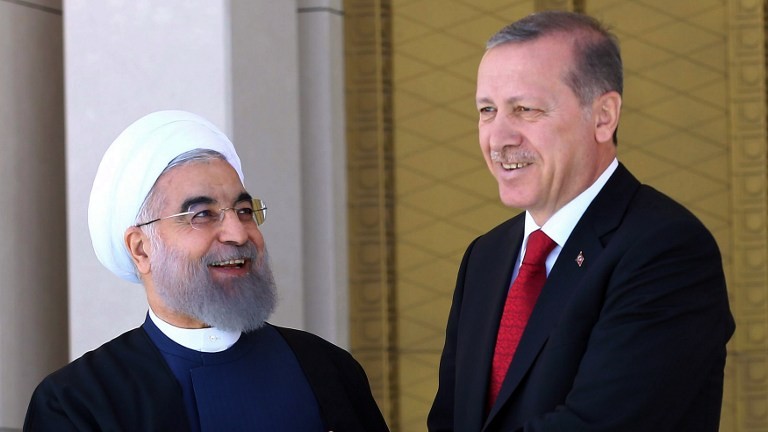Turkey’s relations with Iran were mainly defined in antagonistic terms in the form of a geopolitical contest for expanding regional spheres of influence across the region.
Ankara’s solidarity with Tehran in the face of recent protests, however, points to a sea change, an evolution to a more benign rivalry, a form of working partnership rather than locking in a zero-sum competition for regional supremacy.
As protests roil neighboring Iran for more than a week over a tumbling economy and punishing inflation, the Turkish president sees something else as the driving force behind the enduring social unrest.
On Friday, before departing for a visit to France, President Recep Tayyip Erdogan assailed the United States and Israel for fomenting chaos across the region, standing in solidarity with an unfavorable regime in Tehran.
“We cannot accept that some countries — foremost the U.S., Israel — to interfere in the internal affairs of Iran and Pakistan,” Mr. Erdogan media members at a press conference at Istanbul Ataturk Airport.
“It is turning the people against each other in these countries. It’s a shame that we have seen this done in many nations… We saw this in Iraq,” AFP quoted him as saying.
Iran has been reeling from mass protests in rural areas. So far 21 people were killed in protests, with Tehran deploying elite Revolutionary Guards to quell the unrest, the largest since 2009 uprisings that swept into Tehran and threatened to shake the roots of the Iranian regime.
What started as a small protest in Mashad, second largest Iranian city, quickly unraveled into a display of nationwide social anger over crumbling economy and holler promises of the regime after international sanctions against Iran were lifted.
“Erdogan knows very well that the region needs stability and that the demonstrators are in the minority,” said Professor Arshin Adib-Moghaddam, Chair of Centre for Iranian Studies in the University of London and author of “Psycho-nationalism: Global Thought, Iranian Imaginations” published Cambridge University Press.
“After all this is not even close to a revolutionary situation,” he noted in remarks to The Globe Post Turkey.
The unexpected eruption of swelling anger appears to be a new challenge for Iran’s political elites, hardliners and reformers alike. Still, Tehran, which saw mass protests by millions of people in Green Revolution in 2009, has remained largely quiet in contrast to the clashes that swept the countryside.
President Erdogan’s endorsement of his Iranian counterpart Hassan Rouhani’s handling of the protests is a testimony to the blossoming ties, unthinkable only years ago given the geopolitical rivalry between two powers in the region and the clash of competing agendas in Syria’s ravaging civil war.
The Turkish leader on Thursday emphasized the importance of peace and stability in Iranian society and endorsed Mr. Rouani’s statement that protests should not lead to “violations of the law.”
Mr. Erdogan found himself enduring nationwide protests in 2013 summer when public discontent over a government project to transform Gezi Park in Istanbul Taksim Square to a mall and a replica of Ottoman-era military barracks morphed into large-scale street demonstrations.
“Two years ago, it was unimaginable to expect such vocal support from the Turkish government to Tehran,” Mustafa Gurbuz, a non-resident policy analyst at Arab Center in Washington, D.C., told The Globe Post Turkey.
Turkey’s rapprochement with Iran, he argued, is an outcome of multiple factors including cooperation against Kurdish movements in Syria and Iraq.
He believes that President “Erdogan’s strong language against the U.S. is also due to the recent verdict against” a chief executive of the Turkish state bank in a New York court.
“Given that the verdict puts accusations against the Turkish government for evading Iran sanctions, it is a perfect opportunity for Erdogan to defend himself by actively denouncing American policy towards Iran,” he said in conclusion.
Turkey’s backing of Iran runs counter to the recent memory of mutual recriminations and acrimony that defined the ever-evolving relationship from one mood to another.
Only years ago, President Erdogan accused Tehran of expanding “Persian imperialism” across the region. Ankara is at loggerheads with Rouhani’s government over its unflinching support for the Bashar al-Assad regime in Damascus.
The two neighbors have backed rival sides in Syria’s years-long war. Now, they are, along with Russia, trying to spearhead regional diplomatic efforts for a lasting political settlement to resolve the elusive conflict.




Comments are closed.